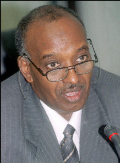Sudan backtracks on Darfur autonomy as UN refugee chief in Khartoum
 KHARTOUM, Sept 28 (AFP) — A Sudanese minister backtracked on government offers of greater autonomy for Darfur as the cabinet finalised an action plan for the devastated western region, Khartoum newspapers said Tuesday.
KHARTOUM, Sept 28 (AFP) — A Sudanese minister backtracked on government offers of greater autonomy for Darfur as the cabinet finalised an action plan for the devastated western region, Khartoum newspapers said Tuesday.
UN refugee chief Ruud Lubbers, who was to hold talks with President Omar al-Beshir later Tuesday, has repeatedly called for self-rule for Darfur during a tour that has already taken him to refugee camps in neighbouring Chad and displaced person camps in the region itself.
But Sudan’s junior foreign minister Naguib al-Khair Abdel Wahab [photo] was quoted as saying that self-rule for the non-Arab minorities of Darfur was an issue that would not be considered until a later stage in troubled peace talks with rebel negotiators in Nigeria.
He rejected calls from Lubbers, the UN High Commissioner for Refugees who arrived here Monday, for an immediate pledge of a genuinely federal constitution for all regions of Sudan to address the grievances of the Darfur minorities, the Al-Sahafa reported.
The government would insist on “political arrangements which will be based on principles endorsed by the government in the constitution and Naivasha protocols,” he said.
The latter was a reference to preliminary agreements with southern rebels of the Sudan People’s Liberation Army granting self-rule to the south and disputed adjacent districts.
Sudan’s existing constitution grants very limited autonomy to an array of states, but critics say the units are deliberately drawn up to divide the traditional regions of this vast country — the biggest in Africa.
Abdel Wahab’s comments marked a significant toughening of position from a pledge made by Information Minister Al-Zhawi Ibrahim Malik in an AFP interview on August 3.
“We are ready to share power and resources in Darfur, we are ready for genuine federalism,” Malik said then.
The junior foreign minister said he was nonethless optimistic that the key political round of peace talks with the Darfur rebels planned to open October 21 would “not be as tense and difficult as the previous round.”
A genuinely federal constitution is a demand that has long been made not just by the SPLA and the Darfur rebels, but also by non-Arab minorities in eastern and central Sudan.
However successive Arab-dominated governments in Khartoum have always rejected the idea, sparking rebellions among the Beja people of Kassala and Red Sea states, and the minorities of the central Nuba mountains, as well as the Fur, Massalit and Zaghawa of Darfur.
The Sudanese minister said the cabinet had now finalised its action plan to meet a UN Security Council ultimatum to stem the suffering caused by its bloody 19-month clampdown in Darfur, where up to 50,000 people have died and 1.4 million been driven from their homes, according to UN figures.
The government “has finished preparing a complete plan for dealing with the recent Security Council resolution,” Abdel Wahab told Al-Sahafa.
He offered no details of the blueprint, saying only that Khartoum would “implement the plan in cooperation with the African Union in its capacity as the primary sponsor of the Darfur question.”
Resolution 1564 renews previous UN demands for Khartoum to rein in Arab militias it armed in Darfur to suppress the minority rebels, and provide the necessary security and aid distribution to allow the displaced to return to their homes.
It also requires the government to prosecute militia and security force commanders responsible for the grosser abuses in the government’s clampdown, which rights groups say include the wholesale destuction of minority villages and systematic resort to rape as a weapon.
